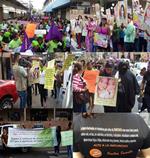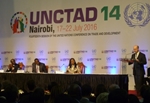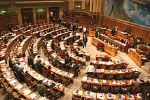Social Watch News
Published on Sat, 2016-07-30 12:23

Palace of the Nation, seat of the
Belgian Federal Parliament in
Brussels.(Photo: Belgian
government)
|
In September 2015, Belgium declared that the 2030 Agenda will give a new élan for Belgian global engagement, calling for human rights, LGBT rights, women's rights, decent work and the power of digitalization, concluding that Belgium was ready to implement the agenda. However, by referring mainly to international cooperation, it was not clear if Belgium accepted the challenge to also change its national policy in order to reach the 2030 Agenda.
A national strategy framework is to be established by September 2016 involving all levels of government, under the auspices of the Inter-Ministerial Conference for Sustainable Development, which is best suited to ensure a coherent strategy among the three regions and the federal government. Nevertheless, midway into the first year of implementation, the policy actions needed remain distant. Belgian civil society organizations demand and urgent and clear response to the challenges of this ambitious universal 2030 Agenda, and to commit to develop an integrated, overarching strategy covering internal and external affairs.
|
Published on Sat, 2016-07-30 12:21

March against violence and
femicide. (Photo: CEM-H)
|
Honduras has committed itself to implementing the 2030 Agenda and this commitment is essential to overcoming the pervasive violence in the country. Honduras has the highest level of economic inequality in Latin America and is listed as the most violent of all countries that are not in a war situation. Women's lives are particularly at risk, which means that achieving gender equality and empowering all women and girls by 2030, as mandated by SDG 5, will be a major challenge. More than 18,000 women and girls reported suffering sexual violence between 2010 and 2015, but in less than 6 percent of the cases have perpetrators been condemned.
Implementing the SDGs requires political and the reallocation of resources currently devoted to re-militarization, it is clear that human rights are not the priority. Only if social organizations, with the support of the international community, encourage compliance may the situation of the Honduran people improve.
|
Published on Fri, 2016-07-29 09:59
Due to UNCTAD’s decidedly pro-South and uncompromising development-focused mission, its quadrennial conferences have traditionally been North –South showdowns. Coming a few months after the adoption of the ambitious and universal 2030 Agenda for Sustainable Development and its 17 associated goals, the theme of the XIV Quadrennial Conference of UNCTAD (the United Nations Conference on Trade and Development) was “From Decisions to Actions.” There was, therefore, reason to expect that this time members would bridge their differences for the sake of reinforcing mandates of the organization critical to the Agenda’s implementation. But that was not the case, and the dynamics were a lot more akin to the difficult ones witnessed in the inaugural Financing for Development (FFD) Forum last April.
|
Published on Fri, 2016-07-29 09:56
In the implementation phase of the 2030 Agenda for Sustainable Development, it is important to learn from the mistakes of the past and to truly advance a holistic framework. From DAWN’s perspective, using an interlinkages and rights-based approach to the implementation of the Sustainable Development Goals (SDG) might be useful to assess and promote positive synergies. This article offers ideas for achieving this by looking at the example of how tackling illicit financial flows could help the fight against women’s trafficking.
|
|
Published on Fri, 2016-07-29 00:00
|
Published on Fri, 2016-07-22 19:03
The negative impact on developing countries of the secrecy of the Swiss banking system, which encourages damaging tax evasion, corruption and illicit financial flows, was highlighted by civil society when Switzerland submitted its report about the 2030 Agenda to the United Nations. "Switzerland continues to host the largest offshore financial centre in the world" says the alternative report of Aliiance Sud. In 2015, Swiss banks administered foreign assets in the total amount of 2,300 billion francs.
|
Published on Fri, 2016-07-22 18:59

Protest against fracking
|
The Mexican legal framework on energy amended in 2013 and 2014 presents obstacles to the exercise of human rights as well as to achieving the SDGs, as it prioritizes the activities of exploration and exploitation of hydrocarbons "over any other involving the use of the surface and subsurface of the lands concerned". The framework establishes several legal provisions such as the determination of legal easements for hydrocarbons to public, private, national and transnational energy projects (some of which employ harmful techniques such as hydraulic fracturing or fracking), which constitutes a regression in terms of human rights and the environment, while seriously compromising the achievement of the SDGs.
|
|
Published on Fri, 2016-07-22 18:24
|
Published on Tue, 2016-07-19 11:59
How much is tax collection dependent on the policies of one individual country? When discussing tax policy a common tendency used to be to treat it as an exclusively domestic policy matter, one to which only the prerogatives and obligations of the State where the respective taxes are to be collected are relevant. Reality could be nothing further from the truth, as demonstrated by the amounts of revenue that get lost to tax evasion and avoidance by international actors because of their ability to straddle across a diversity of national jurisdictions. As more of such tax maneuvers come to light, international cooperation for tax matters gains more prominence on the development finance agenda.
|
Published on Mon, 2016-07-18 11:42

CESR Executive Director Ignacio
Saiz speaks at the side event
on July 12
|
Inequality has been center stage at the United Nations headquarters in recent days, as government officials, development experts and civil society representatives gathered for the first meeting of the High-Level Political Forum on Sustainable Development (HLPF) since the Sustainable Development Goals (SDGs) were agreed.
The HLPF is the main platform for the follow-up and review of the 2030 Agenda for Sustainable Development. The theme of this year’s HLPF – and one of the most potentially transformative elements of the Agenda – is the critical commitment to “leave no one behind.”
|
SUSCRIBE TO OUR NEWSLETTER
Submit

|









